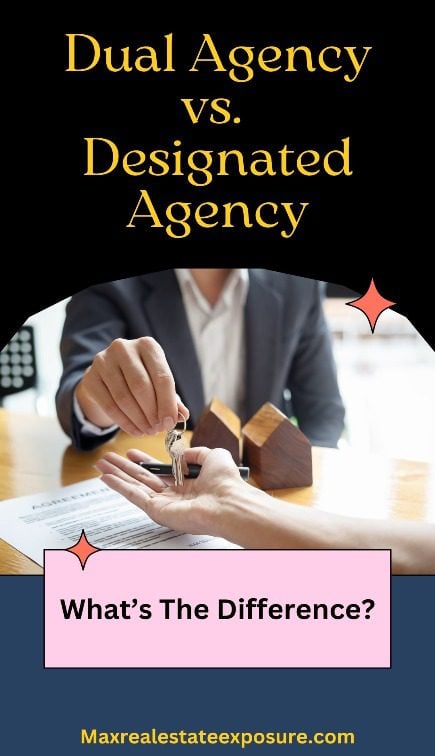 Are you wondering about the difference between dual agency and designated agency?
Are you wondering about the difference between dual agency and designated agency?
Dual agency and designated agency are two distinct approaches in real estate transactions. In dual agency, a single agent represents the buyer and seller, potentially creating conflicts of interest. However, it can facilitate more accessible communication.
On the other hand, a designated agency involves separate agents for the buyer and seller within the same agency, providing more ethical representation.
Understanding the nuances, pros and cons, legal considerations, and critical differences between these models is crucial for informed decision-making in real estate. Buyers and sellers should understand several types of agency in real estate. These are two of them.
From experience as a Realtor, many consumers have no idea how agency law works. Unfortunately, some real estate agents they run into don’t adequately explain it. We will comprehensively examine the differences between dual and designated agencies.
Understanding Dual Agency
Dual agency is a concept that arises in real estate transactions involving a single agent representing the buyer and the seller. This arrangement can present a unique set of advantages and disadvantages. However, the drawbacks of dual agency significantly outweigh any potential upsides.
What is Dual Agency?
Dual agency occurs when a real estate agent acts as a representative for both the buyer and the seller in the same transaction. Instead of having separate agents advocating for each party’s best interests, a dual agent becomes a neutral intermediary.
The double agent remains impartial and strives to facilitate effective communication between the buyer and seller.
Can a Real Estate Agent Represent a Buyer and a Seller?
No, they cannot. With dual agency in real estate, an agent cannot give either party advice. Doing so would conflict with the other party. Folks, that is not “representation. A buyer’s agent can provide the buyer advice. A seller’s agent can provide the seller with advice.
A dual agent, by law, cannot provide either party guidance in the transaction. If you are intelligent, you are beginning to see why dual agency is terrible for consumers.
Since it is a horrible arrangement, dual agency has been made illegal in several states. Double agents should be banned everywhere. The concept is not consumer-friendly.
Pros and Cons of Dual Agency
Dual agency has few benefits and mostly drawbacks. Let’s explore some of them:
Pros:
- Simplified communication: Having one agent handling both sides of the transaction can streamline communication between the buyer and seller.
- Efficiency: Dual agency may expedite the transaction process by eliminating the need for agent coordination.
Cons:
- Conflict of interest: Dual agents must manage potential conflicts of interest if the buyer’s and seller’s interests diverge.
- No advice: The real estate cannot provide counseling like they would in a respective buyer’s or seller’s agency relationship.
- No research for buyers: When buying a property, a buyer’s agent will provide research and due diligence to ensure a good purchase decision. This cannot happen in dual agency.
- No seller guidance: Is the buyer asking for unusually long contingency dates? Are the home inspection requests reasonable? Sorry, but the agent cannot guide you. Doing so would be practicing illegal dual agency.
- Complete representation concerns: The buyer and seller may be concerned about whether their best interests are fully prioritized.
Legal Considerations of Dual Agency
Awareness of dual agency’s legal implications is crucial, as regulations may vary by state. As mentioned, some states have dual agency restrictions, which may even be considered illegal in certain jurisdictions.
Understanding and abiding by the rules and regulations regarding dual agency is pivotal to ensuring compliance and protecting all parties’ interests.
Exploring Designated Agency
 Designated agency is an alternative approach in real estate transactions where separate agents within the same agency represent the buyer and seller, respectively. This method emphasizes ethical representation and gives each party an agent fully dedicated to their interests.
Designated agency is an alternative approach in real estate transactions where separate agents within the same agency represent the buyer and seller, respectively. This method emphasizes ethical representation and gives each party an agent fully dedicated to their interests.
Many years ago, buyers did not have the option of representation. Every real estate agent represented the seller as a sub-agent. Agency law changed in the 90s, giving buyers the opportunity for representation.
What is Designated Agency?
In designated agencies, the buyer’s and seller’s agents work independently with their respective clients. They have a fiduciary duty to act in their client’s best interests, providing personalized guidance and advocacy throughout the transaction process.
It is the opposite of dual agency, where the clients do not get any advocacy.
Benefits of Designated Agency
Designated agency offers several advantages over dual agency. First and foremost, it ensures that both the buyer and seller receive comprehensive representation without conflicts of interest. Each party can trust their designated agent to work solely on their behalf, promoting negotiation transparency and fairness.
- Personalized Guidance: Designated agents focus solely on their client’s needs, providing tailored advice and assistance throughout the buying or selling process.
- Conflict Resolution: With designated agency, agents can navigate potential conflicts among their clients while maintaining a fair and objective stance
- Confidentiality: Designated agents maintain privacy and do not disclose sensitive information to the other party.
Addressing Potential Conflicts in Designated Agency
While designated agency promotes ethical representation, it’s crucial to address potential conflicts that may arise. Agents must communicate openly with their clients about any limitations or constraints related to the designated agency relationship.
- Clear Communication: Designated agents should establish effective communication channels with their clients to ensure open and honest dialogue.
- Managing Information: Agents must inform clients about new developments and potential transaction issues.
- Avoiding Dual Role: Designated agents must focus solely on their client’s interests and avoid any actions resembling dual agency.
By proactively addressing these potential conflicts, the designated agency can offer a transparent and mutually beneficial representation for buyers and sellers in real estate transactions.
What The Pundits Say About Designated Agency
There are pundits against designated agency. They are primarily owners of buyer’s agency-only companies. You shouldn’t be surprised. These folks will try to tell everyone their way is better because they only represent buyers. So what? How does a buyer get better representation?
Unfortunately, some people who work for these companies spread tall tales online. They will say things like agents in designated agency firms share information on their clients. It’s a big fat lie.
You’ll also see them saying that designated agency is no better than dual agency because the real estate broker (owner) becomes a double agent. Again, so what? Real Estate brokers don’t get involved in the negotiations of transactions. They are neutral parties if there is a conflict. Exactly what you would want them to be.
Critical Differences Between Dual Agency and Designated Agency
When it comes to real estate transactions, understanding the critical differences between dual agency and designated agency is crucial. These two representation models have distinct characteristics that can significantly impact buying and selling.
Let’s explore the key aspects that set them apart.
Representation of Buyer and Seller
In dual agency, a single agent represents the buyer and seller in the same transaction. This can create a conflict of interest as the agent must balance the needs and objectives of both parties.
On the other hand, designated agency utilizes separate agents to represent the buyer and seller individually, ensuring each party receives dedicated and unbiased representation.
Communication and Conflict of Interest
Dual agency can streamline communication between the buyer and seller since they work with a single agent. However, it can also introduce conflicts of interest where the agent may prioritize their financial gain over the best interests of one or both parties. Designated agency, on the other hand, minimizes conflicts by assigning separate agents who can solely focus on advocating for their respective clients.
Legal Regulations and Restrictions
While dual agency may be permitted in some states, it is essential to note that it can be considered illegal in others due to the potential risks and conflicts involved.
Designated agency, on the other hand, is generally seen as a more ethical approach, aligning with regulations and professional standards. It offers a transparent and legally compliant framework for representing buyers and sellers in real estate transactions.
Understanding these crucial differences between dual agency and designated agency is vital for making informed decisions in real estate. Buyers and sellers can select the agency model that best aligns with their needs and interests by considering the varying levels of representation, communication dynamics, and legal considerations.
The Role of Real Estate Agents in Dual Agency vs. Designated Agency
 Real estate agents are crucial in facilitating transactions while ensuring ethical practices in the dual agency and designated agency world. They must meet training and licensing requirements to represent buyers and sellers in these models legally.
Real estate agents are crucial in facilitating transactions while ensuring ethical practices in the dual agency and designated agency world. They must meet training and licensing requirements to represent buyers and sellers in these models legally.
Let’s explore the responsibilities of agents in dual agency and the ethical considerations involved in designated agency.
Training and Licensing Requirements
Real estate agents in both dual agency and designated agency must undergo extensive training and obtain the necessary licenses to practice. This training equips agents with the knowledge and skills to navigate complex real estate transactions effectively while adhering to legal requirements.
A license involves completing pre-licensing courses, passing exams, and meeting state-specific criteria.
Responsibilities to Clients in Dual Agency
Real estate agents have a unique responsibility to the buyer and seller in dual agency. They must provide fair and unbiased guidance to both parties throughout the transaction.
Agents should prioritize open and transparent communication, ensuring that all relevant information is shared with the buyer and seller to make informed decisions. Agents must maintain confidentiality and avoid any conflicts of interest that may compromise the best interests of their clients.
Ethical Considerations in Designated Agency
In designated agency, real estate agents are assigned to represent either the buyer or the seller exclusively. Their primary responsibility is to prioritize the interests of their respective clients while avoiding any conflicts of interest.
Agents must provide comprehensive and diligent representation, ensuring their client’s needs, preferences, and objectives are met throughout the transaction.
Ethical considerations include maintaining open communication, disclosing relevant information, and acting in the client’s best interests.
How Dual and Designated Agency Impact Real Estate Transactions
Understanding the impact of dual and designated agencies is crucial when navigating real estate transactions. Both models have distinct implications for negotiations, transparency, fairness, and protecting the interests of buyers and sellers.
Navigating Negotiations in Dual Agency
Negotiations can become complex in dual-agency situations where a single agent represents the buyer and seller. The agent must work diligently to balance the interests of both parties while avoiding conflicts of interest.
- The agent must provide neutral advice and guidance to ensure a fair negotiation process.
- Clear communication becomes paramount, as the agent needs to relay offers, counteroffers, and other relevant information between the buyer and seller.
- The agent must maintain confidentiality on any sensitive details disclosed by either party during negotiations.
- Proper documentation is crucial to ensure transparency and accountability.
Ensuring Transparency and Fairness in Designated Agency
On the other hand, the designated agency aims to achieve greater transparency and fairness by assigning separate agents for the buyer and seller. This model allows for a more robust representation of each party’s interests and reduces potential conflicts.
- The designated buyer’s agent focuses on understanding the buyer’s requirements, advocating for their best interests, and guiding them through property selection, viewings, and negotiations. Many buyer’s agents will ask their clients to sign a buyer agency agreement. This contract spells out each party’s responsibilities to one another.
- The designated seller’s agent aims to secure the best offer for the seller, strategically pricing the property, marketing it effectively, and negotiating with potential buyers.
- Designated agents are accountable to their respective clients and work towards ensuring fairness in the transaction while complying with legal and ethical obligations.
- Regular communication and updates are essential for maintaining transparency and fostering trust.
Making Informed Decisions: Choosing Between Dual and Designated Agency
Factors to Consider when Selecting an Agency Model
Several factors should be considered when deciding between dual agency and designated agency. These factors include:
- Level of trust: Consider how comfortable you are with sharing confidential information with a single agent in dual agency or having separate agents in designated agency.
- Conflicts of interest: Assess the potential disputes that may arise in dual agency, as the agent represents both parties, compared to the reduced likelihood of disputes in designated agency.
- Communication preferences: Reflect on your communication style and determine if you prefer direct communication with a single agent or separate agents for buyer and seller.
- Legal requirements: Familiarize yourself with the legal regulations and restrictions surrounding your state’s dual and designated agencies.
Ensuring a Smooth Transaction: Tips for Buyers and Sellers
A smooth transaction is essential when buying or selling a property. Here are some valuable tips to ensure a successful real estate experience:
Questions to Ask Potential Real Estate Agents
Choosing the right real estate agent is crucial in facilitating a smooth transaction. When interviewing potential agents, consider asking the following questions:
- What is your experience in the local market?
- How familiar are you with the neighborhood or area where I buy or sell?
- Can you provide references from past clients?
- What services do you offer to buyers or sellers?
- What is your approach to negotiation?
Strategies for Successful Collaboration in Dual Agency
Effective collaboration is essential if you decide to work with a dual agent. Consider the following strategies:
- Establish clear lines of communication from the beginning.
- Be transparent about your goals, priorities, and concerns.
- Ensure that the agent maintains unbiased representation throughout the process.
- Regularly review and discuss progress and any potential conflicts of interest.
- Stay actively involved in the decision-making process.
Establishing Trust and Transparency in Designated Agency
In a designated agency model, building trust and maintaining transparency is critical. Consider these approaches:
- Choose separate agents who specialize in representing buyers and sellers.
- Communicate your expectations and preferences to your designated agent.
- Regularly discuss any concerns or issues that may arise during the transaction.
- Ensure that your agent keeps you informed about critical updates and negotiations.
- Maintain open and honest communication with your designated agent for a successful partnership.
By following these tips, buyers and sellers can navigate the dual agency or designated agency process smoothly, enhancing the likelihood of a successful real estate transaction.
About the Author: The above Real Estate information about dual agency vs. designated agency was provided by Bill Gassett, a Nationally recognized leader in his field. Bill has expertise in mortgages, financing, moving, home improvement, and general real estate.
Learn more about Bill Gassett and the publications he has been featured in. Bill can be reached via email at billgassett@remaxexec.com or by phone at 508-625-0191. Bill has helped people move in and out of Metrowest towns for the last 37+ years.
Are you thinking of selling your home? I am passionate about real estate and love sharing my marketing expertise!
I service Real Estate Sales in the following Metrowest MA towns: Ashland, Bellingham, Douglas, Framingham, Franklin, Grafton, Holliston, Hopkinton, Hopedale, Medway, Mendon, Milford, Millbury, Millville, Natick, Northborough, Northbridge, Shrewsbury, Southborough, Sutton, Wayland, Westborough, Whitinsville, Worcester, Upton, and Uxbridge MA.

